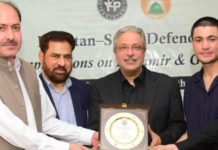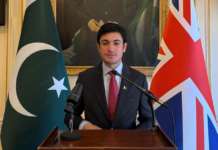
Almost for two decades, after the crumbling of the USSR (Union of Soviet Socialist Republic) in the 1990s, the USA enjoyed its political hegemony and dollar supremacy without any resistance. However, China’s assertiveness on the international forum since the financial crisis of 2008 and particularly President Xi Jinping of the communist party took charge in 2012-2013 is proved a greater challenge to the US’ ideology of capitalism in the world.
The Built and Road (BRI) initiative by China is a vast net of investment worth of 8 trillion dollars that has engaged 130 countries of the world: 70 countries directly across Asia, Europe, Africa, Latin America, and the Caribbean, while another 60 countries including South Korea have already ratified BRI agreements despite being not directly affected.
The economic rise of China has always been seen by the United States with ample suspicion. China’s economic success not only creates hurdles for the United States in the field of the economy but also in political and military domains. To contain China’s rise, Trump administration, two years back, in July 2018 unleashed a trade war with China, later turned into a full-scale economic and political war.
Furthermore, the Covid-19 pandemic added insult to injury, Donald Trump has regularly tweeted to blame China for the Covid-19 pandemic and said that novel coronavirus ought to be called “China virus.” The White House, on May 20, released a report against the backdrop of the ongoing Covid-19 pandemic. The report suggested the changes in the United States’ strategic approach to the People’s Republic of China. The report says that Beijing’s efforts under the leadership of Xi Jinping challenge the American belief in the right of every person to life liberty, and the pursuit of happiness. Similarly, the report shows that the United States will compel Beijing to cease or reduce actions harmful to the United States’ vital, national interests, and those of US allies and partners.
According to Thucydides trap ” when one great power threatens to displace another, war is almost always the result”. Therefore, China is checkmating the United States in global leadership that has given birth to a new Cold War. Secretary of state Mike Pompeo speaks at Richard Nixon Presidential Library in cold war terms that Washington would seek to change Beijing’s behavior for generating a threat to “free democracies around the world.” Reciprocally, the US should give up its “wishful thinking” of changing China, Chinese Foreign Minister Wang Yi said in a communique and accused US politicians of pushing for a New Cold War.
The ongoing confrontation between China and the US has split the world into two poles: the US and China. And which train Pakistan would catch, is the million-dollar question. In this situation, Pakistan could face daunting challenges from both superpowers: Washington knows that claiming the vote of Pakistan against China on concurrent issues is a herculean task. Aiming to pressurize Islamabad the USA could sanction Pakistan, withdraw its Coalition Support Funds, and could label allegations of backing terrorism in the region. It would not stop here, the US and its strong lobbying forces at Financial Action Task Force (FATF) would push Pakistan into FATF Black List. Furthermore, the US will try to undermine Pakistan through international financial institutions such as the International Monetary Fund and the World Bank. Such a move would hasten Pakistan’s economic problems alongside political crises.
Additionally, the US strongly opposes our relations with China, particularly on China Pakistan Economic Corridor (CPEC) as part of the BRI. Hence, BRI and CPEC act as a spark in the emerging Cold War confrontation and place Pakistan in a deadlock situation. Moreover, the US is backing India’s conventional and strategic military build-up to counter-balance China in South Asia. America has also endorsed India’s regional hegemonic ambitions which is an existential threat to Pakistan’s sovereignty and it will jeopardize peace initiatives of Pakistan in the region.
As far as China-Pakistan relations are concerned in the New Cold War, it would be rock-solid. The long-standing ties between Islamabad and Beijing have been mutually beneficial. Maintaining brotherly relations with China has been the top priority of Pakistan’s foreign offices since 1947. Both countries exchange economic, military, and technical assistance with each other. Most importantly, the political support for each other on the international forum is unprecedented. China favors Pakistan on the issue of Kashmir, while Pakistan defends China on the matter of Xinjiang, Taiwan, and Hong Kong. Irrespective of China-Pakistan growing ties the US will do their best to remain a power that Pakistan would like to stay associated with.
In this important battle of nerves, Pakistan is stuck in the middle of two political and economic heavyweights that have vested interests to secure Pakistan’s cooperation in the region. Pakistan’s strategies must be clear and understandable. Firstly, Pakistan should seek greater political, security, and large economic ties with China. Secondly, Pakistan should also cash the renew ties with Trump administration. The United States of America direly needs Pakistan’s logistics and intelligence support for the US army safely withdrawal, US-Taliban dialogue, and intra-Afghan negotiation before the presidential election in November 2020.
Furthermore, the importance of Pakistan in Afghan peace efforts is reiterated by the US special representative for Afghanistan Reconciliation, Zalmay Khalilzad, in an interview to The Hindu newspaper. He says: ” I believe that the Pakistani leadership has supported the peace process, and if we are talking about reconciliation in Afghanistan, support from Pakistan is very important”. Washington cannot deny the indispensable role of Pakistan in the New Cold War. US military general, Mark Milley testified that the United States needs to maintain strong military-to-military ties with Pakistan, based on the shared interests of the two countries. He pointed out that President Trump’s South Asia strategy recognized Pakistan as “a key partner” in achieving US interests in South Asia, including developing a political settlement in Afghanistan.
Meanwhile the political and economic clashes of the US-China, Pakistan does not want to give the impression that the country has completely become a part of either the Chinese or US sphere of influence. It would be firmly wrong, as many political think-tanks speculate that Pakistan can sustain the US economic and political pressure or the Chinese departing from financial and diplomatic assistance. In addition to this, Pakistan should not put all eggs in one basket rather Pakistan’s foreign policy must seek a neutral position this time. Islamabad has to maintain close ties with both the major powers of the world in the emerging Cold War. There will be diplomatic challenges for Pakistan for the next several years. Wear the seat belt, the roller coaster is on.




I really appreciate the writings of Mr. Aqib Javed. A wonderful analysis with a logical suggestion at the end.
👍🏿❤
One of the best articles i studied on this topic….waiting for some brother❤
❤👍🏿
Well crafted, organized and chronological description about the Pak role in china-america new cold war make the article attractive and genuine. Historical facts are depicted in a brief and authentic manner. Information regarding previous ties of Pakistan with both countries are drawn in an effective way. End of the article leave you to analyse the situation in your own way.
❤👍🏿
Daghasy do
Great analysis sir.
👍🏿❤
Great thoughts 👍🏻👍🏻
Good work.Keep it up.
👍🏿❤
Well written very informative Mashallah
👍🏿❤
The article has tickled pakistan’ problems and issues regarding the two major politicle and economic power in a beautiful way.Best wishes ahead!
Waiting for next article.
Really a wonderful writing and provide good suggestions to the current problems of pakistan. Waiting for another article of Mr. Aqib Javed.
👍🏿❤
The article has tickled pakistan’ problems and issues regarding the two major politicle and economic powers in a beautiful way.Best wishes ahead!
Waiting for next article.
Wow, exactly the article for which i was looking since last two months. Will be happy; if you could provide us more like this❤
👍🏿❤
Such an informative article. Pakistan should exactly stand in the position mentioned by the writer.
👍🏿❤
I love this article. The way you have depicted chronological order of the events, pointing out the problems and then have very good solutions to those problems and showing pathway for Pakistan to have neutral role in this ongoing cold war is really admirable.
You got cleared my confusion about China-US economic and political conflicts for getting and maintaining supremacy over the world.
Thank you very much and waiting for such a helpful, useful and meaningful articles.
❤👍🏿
I really appreciate your thoughts… 😍
I read it and will say good work with logical analysis.
👍🏿❤
Very well said👍
It is really a challenging task for Pakistan to maintain ties at balance. We need good governance and good leaders indeed.
Wonderful critical analysis. Would love to get clear standing of Pakistan at the moment.
Some classy words of Nelson Mandela “a big mistake by some analyst is that they think that their enemies must be our enemies”.
In my view Pakistan needs to be very much clear in choosing its friends rather than depending on others friends list. To establish its sovereignty Pakistan foreign policy should be clear, otherwise trust deficit will further through Pakistan in deep isolation.
❤👍🏿